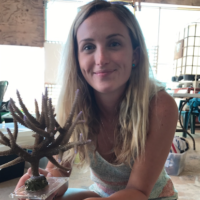Claire Ross
PhD graduate
University of Western Australia
claire.ross@research.uwa.edu.au

From 2005 to 2022, the main node of the ARC Centre of Excellence for Coral Reef Studies was headquartered at James Cook University in Townsville, Queensland (Australia)








Claire completed a Bachelor of Science (Hons) majoring in marine biology and coastal management in 2013. Claire is now a PhD student at UWA in Perth, under the supervision of Prof. Malcolm McCulloch, Dr. Thomas DeCarlo, Asst/Prof. Jim Falter, and Dr. Verena Schoepf.
Coral calcification mechanisms, climate impacts to coral reefs, and the use of corals as paleo-climate proxies
Ross C.L., Schoepf V, DeCarlo T.M, McCulloch M.T. (2018) Mechanisms and seasonal drivers of calcification in the temperate coral Turbinaria reniformis at its latitudinal limits. Proc. R. Soc. B 285: 20180215. http://dx.doi.org/10.1098/rspb.2018.0215
Ross, C.L., Falter, J.L., McCulloch, M.T. (2017) Active modulation of the calcifying fluid carbonate chemistry (δ11B, B/Ca) and seasonally invariant coral calcification at sub-tropical limits. Scientific Reports 7, Article number: 13830.
Le Nohaïc, M., Ross, C.L., Cornwall, C.E., Comeau, S., Lowe, R., McCulloch, M.T., Schoepf, V. (2017) Marine heatwave causes unprecedented regional mass bleaching of thermally resistant corals in northwestern Australia. Scientific Reports 7, Article number: 14999.
Ross, C.L., Falter, J.L., Schoepf, V., McCulloch, M.T. (2015) Perennial growth of hermatypic corals at Rottnest Island, Western Australia (32°S). PeerJ. 3:e781.
Foster T., Short J., Falter J., Ross C., McCulloch M. (2014). Reduced calcification in Western Australian corals during anomalously high summer water temperatures. Journal of Experimental Marine Biology and Ecology461:133–143.
Phone: +61 4 3227 2636 Email: claire.ross@research.uwa.edu.au
ARC Centre of Excellence for Coral Reef Studies, UWA Oceans Institute and School of Earth Sciences, The University of Western Australia Crawley, Western Australia 6009
New DNA techniques are being used to understand how coral reacted to the end of the last ice age in order to better predict how they will cope with current changes to the climate. James Cook Univer
A new study on the effects of climate change in five tropical countries has found fisheries are in more trouble than agriculture, and poor people are in the most danger. Distinguished Profess
James Cook University researchers have found brightly coloured fish are becoming increasingly rare as coral declines, with the phenomenon likely to get worse in the future. Christopher Hemingson, a
Researchers working with stakeholders in the Great Barrier Reef region have come up with ideas on how groups responsible for looking after the reef can operate more effectively when the next bleaching
Abstract: As marine species adapt to climate change, their heat tolerance will likely be under strong selection. Individual variation in heat tolerance and its heritability underpin the potential fo
Abstract: The Reef Ecology Lab in KAUST’s Red Sea Research Center explores many aspects of movement ecology of marine organisms, ranging from adult migrations to intergenerational larval dispersal
Abstract: Macroalgal meadows are a prominent, yet often maligned component of the tropical seascape. Our work at Ningaloo reef in WA demonstrate that canopy forming macroalgae provide habitat for ad
Abstract: Sharks are generally perceived as strong and fearsome animals. With fossils dating back at least 420 million years, sharks are not only majestic top predators but they also outlived dinosa
Abstract: Connectivity plays a vital role in many ecosystems through its effects on fundamental ecological and evolutionary processes. Its consequences for populations and metapopulations have been
Abstract: Evolution of many eukaryotic organisms is affected by interactions with microbes. Microbial symbioses can ultimately reflect host’s diet, habitat range, and even body shape. However, how
Abstract: The past few years have seen unprecedented coral bleaching and mortality on the Great Barrier Reef (GBR) but the consequences of this on biodiversity are not yet known. This talk will expl